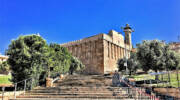The Book of Ruth is much more than a story about one woman’s conversion to Judaism and love for the Jewish people. Many laws and customs are based on her experiences.
By Rabbi Ari Enkin, Rabbinic Director, United with Israel
The Book of Ruth, a central theme of the upcoming holiday of Shavuot, offers much more than meets the eye.
Sure, it can certainly be argued that it is fitting to read the Book of Ruth on Shavuot, as the story occurred right around this time of year. It further shares a common denominator with Shavuot in that it similarly deals with acceptance of the Torah.
The book of Ruth, however, is also the source of many ritual laws that are practiced on a regular basis. First and foremost, of course, are the laws of conversion, which almost completely derive from the episode of Ruth. That’s right – many, if not most, of the procedures related to conversions, practiced every day by rabbinical courts worldwide, stem from that Book of Ruth hidden at the end of your Bible.
The Talmud teaches that prior to Ruth’s conversion, Naomi told her: “We have rules as to where we can and cannot walk on Shabbat, rules regarding our dealings with the opposite sex; we even have 613 challenging commandments to uphold, and we are strictly forbidden to worship idols.” With these few instructions on how to be a Jew came Ruth’s famous response: “Where you walk, I shall walk; where you sleep, I shall sleep; your people are my people, and your God is my God.” It is from here that the Talmud rules: “We inform prospective converts of a few of the less serious commandments and a few of the more serious commandments. We do not overburden the convert with numerous commandments nor with their fine details.”
Another law derived from the story of Ruth is the practice of greeting one another using the name of God, as Boaz [who married Ruth] himself did, as it is written: “Boaz came from Bethlehem and he greeted the reapers with, ‘May God be with you,’ and they responded, ‘May God bless you.’” We fulfill this directive today through the greeting, “shalom aleichem,” and its response, “aleichem shalom.” Shalom, which means peace, is one of God’s names.
Yet another practice derived from the Book of Ruth is the source of the Talmudic teaching, “One may not leave the Land of Israel to go abroad unless the price of wheat has risen…but if one can still purchase wheat, although somewhat costly, one may not leave.” As 2nd-century sage Rabbi Shimon bar Yochai used to say: “Why were Elimelech, Machlon and Chilyon, the greatest scholars and leaders of the day, punished? Because they left the Land of Israel even though wheat was available, albeit at a high price.” Of course, we should take this teaching with a grain of salt, as there are other legitimate grounds for leaving the Land of Israel, which are beyond the scope of this discussion.
Finally, a most beloved and practiced halacha (Jewish law) that few realize derives from the Book of Ruth is washing in preparation for Shabbat, along with donning one’s finest clothing. As Naomi tells Ruth: “Wash yourself, anoint yourself and put on your fine clothes.” The Talmud comments on this verse, explaining: “These were her Shabbat clothes. Rabbi Chanina said: A person must have two sets of garments, one for the weekdays and one for Shabbat.” Indeed, applying fine perfumes in honor of Shabbat was a custom of even the greatest sages and is certainly a meritorious custom we should all consider emulating.
As we can see, the Book of Ruth is much more than simply a story about one woman’s conversion and love for the Jewish people.

Do You Love Israel? Make a Donation - Show Your Support!
Donate to vital charities that help protect Israeli citizens and inspire millions around the world to support Israel too!
Now more than ever, Israel needs your help to fight and win the war -- including on the battlefield of public opinion.
Antisemitism, anti-Israel bias and boycotts are out of control. Israel's enemies are inciting terror and violence against innocent Israelis and Jews around the world. Help us fight back!






















